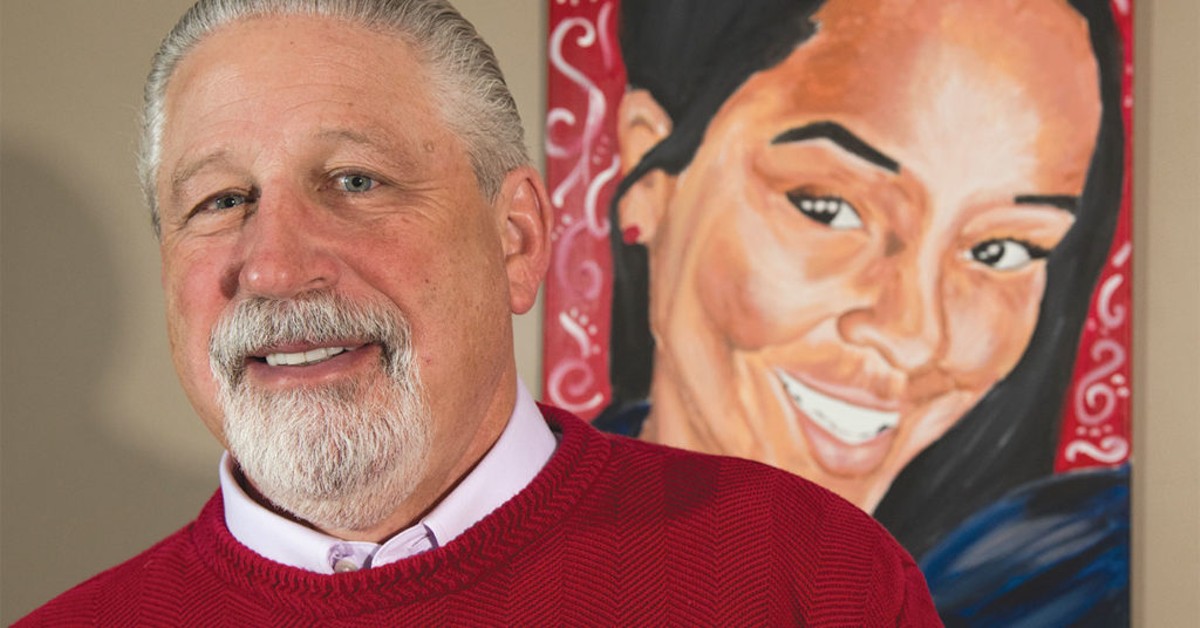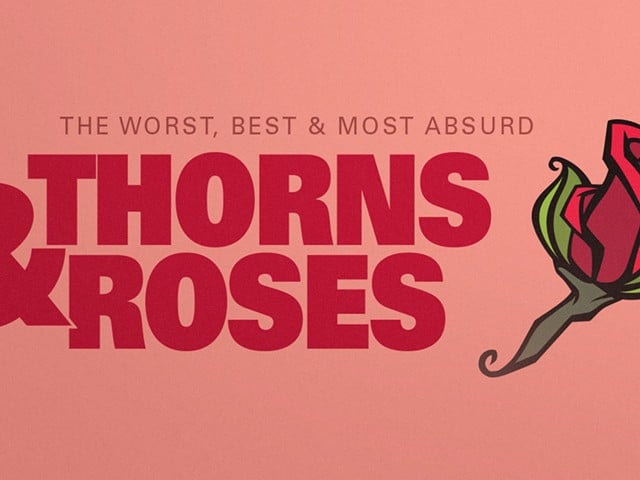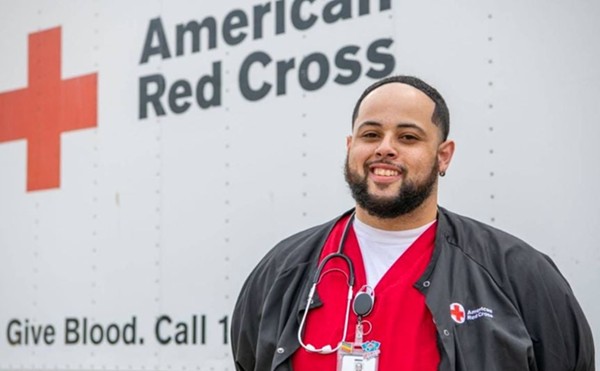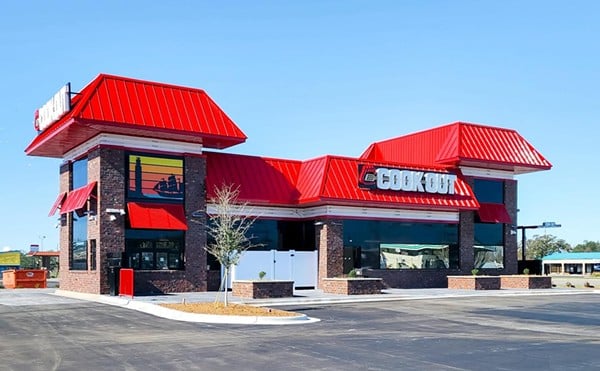[Dean Walker recently lost two children to gun shots. Here is a two-part story. The first (directly below) follows how he is using activism to deal with loss. The second is an excerpt of a speech he gave in December.]
The early morning is cold, the kind of cold that tightens your skin and stings your eyes. Already Dean Walker has had a standoff with a stubborn garage door. He suspects the cold might have caused it to seize up, too.
It hasn’t done that to him.
Life has taught him that you must move forward, even if you don’t move on. He’ll have to figure out the door when he gets home, but he has shown up at an early hour, on a freezing day, to discuss a year that would have stopped most of us in our tracks. Stopping is a luxury he can’t afford. He speaks and acts for his family now.
February 2017: Deborah, his beloved wife of almost 30 years, dies from pancreatic cancer. As terrible as that is, it is an eventuality they anticipated and planned for.
Not so, what came next.
Almost exactly a month later: Savannah, their 20-year-old daughter, a UofL college student who had foregone spring break to stay closer to home after the death of her mom, attends a concert at Tim Faulkner Gallery in the Portland neighborhood of Louisville. Gunfire erupts. Five people are injured. Savannah is killed, the sole fatality. Dean Walker, who has been awakened by cell phone calls from her friends after the violence, but not one from his daughter, gets as close to the gallery as he can. He waits and waits outside the police perimeter. As daylight approaches, realization dawns. His daughter is dead. He waits again. Almost a year later, after no answers and no arrests, he has filed a civil lawsuit against the gallery and the concert promoters over what he believes was gang-related violence at the event. The father thinks no one should be killed at a concert.
Seven months after Savannah’s death: On the eve of turning 28 in October, Nathaniel — known as Nate — who is Dean and Deborah’s son and Savannah’s older brother, kills himself with a gun. To this day, Dean Walker doesn’t know if his son intended to shoot himself, but learning of this death was the point at which the husband and father drops to his knees and screams. Yes, his son had problems with mental illness and self-medication, but the father doesn’t believe his son would have died had Savannah not been killed. Nate had told his dad he didn’t think it was possible for him to be happy again.
In the next hour, as you talk, Dean Walker’s bright blue eyes shine when he speaks of his family, and how he is blessed by the loved ones, friends and neighbors who have become sentries in looking out for his well-being since the series of crushing tragedies.
His eyes occasionally well with tears when he approaches these same subjects.
Sometimes those tears travel south, slowly, along the length of his face.
But the gyre of his emotional journey, at least in this setting, never ventures far from this sacred center:
His family would expect him to continue to live. His idea of his family and his place in it didn’t die with them. It’s up to him to carry his late wife’s passion for education, his late daughter’s commitment to social justice, and his late son’s potential to teach about mental illness, as far forward, and to as many people, as he can.
That’s why he showed up for last November’s Out of the Darkness suicide and awareness walk only a month after his son “played” and lost at Russian roulette with a gun that had a bullet in it. Dean Walker was stunned by the thousands who showed up, instead of the hundreds he expected to see. Since, he has started doing his homework about guns, mental health and suicide, as well as Kentucky’s spending (or lack of it) on mental illness. He is learning bleak, tragic truths that steal lives, violate public trust and health, and stain futures. More than years separate him from the expert marksmanship designations he earned when he was a Western Pennsylvania high school member of the National Rifle Association. He’s not anti-gun per se, he said, but it was too easy for his troubled son to purchase guns quickly and legally. Including the one that ended his life, which he bought, legally, in a few hours’ time after his dad locked up all his others.
That’s why he showed up for last December’s vigil held by the Kentucky members of Moms Demand Action, an advocacy group that promotes common-sense gun reforms. The program commemorated the fifth anniversary of the Sandy Hook massacre, in which 20 young students and six teachers were killed in a mass shooting at a Connecticut elementary school. Dean Walker and other survivors of gun violence were featured speakers in the local service, and this is where he stood before a room of people and shared his grief, the horror of learning his daughter and his son died by guns, and his newfound commitment to find solutions to the gun carnage that affects tens of thousands of Americans every year. Including high schools in Kentucky and Florida in the weeks since that speech. This month, he followed up that appearance with a Moms Demand Action rally in Frankfort, to lobby legislators for gun reform and against what the group thinks are misguided proposals to loosen gun restrictions at Kentucky schools and universities.
And that’s why he showed up on this cold morning more than a month after the vigil and in advance of three difficult first anniversaries. He has not yet been able to go through all the belongings left by his wife, daughter and son, but he has sifted through the experiences of a year that otherwise was a blur to find the way ahead.
His priorities are to work for responsible gun ownership and access to and delivery of mental health care to people who need it.
He wants the city, to which he moved his young family 25 years ago to get away from gang activity in the Bay Area of California, to do more to address gangs in Louisville. He thinks the city should have a gang czar who understands gang culture and how they recruit, retain and sustain their membership. He would like to see a network of positive influences offering boys and young men an alternative to the faux fraternity they may find in gangs. An army of mentors should be at the ready.
And he thinks the city should have one number to call, with humans on the line, around the clock, that would direct those in crisis and in need to available, timely, affordable help regarding mental health and suicide.
Those recommendations come from a different kind of violence that has paid repeat visits in the year that took his children, a passive disregard by bureaucracy and the overloading of the machinery that is supposed to be in place for people like him.
Almost a year after her death, he is no closer to understanding or knowing exactly what happened to Savannah. Louisville police have not been in contact with him, officially, more than once or twice, he said; one of the times came after a local TV station did an update on the story, and he mentioned the lack of contact on the air. He is not waiting anymore. He figures the negligence suit he has filed may start providing some answers, at least about what the police know and don’t know. Beyond that, the father’s next move: One billboard in Louisville. In the next few weeks. Dean Walker plans to put one up along I-65 with Savannah’s picture, an appeal to eyewitnesses, and a tip number to call. Hundreds were at the concert, he said, and someone saw something, knows something and must be willing to come forward in regard to Savannah’s killing.
And: After Savannah’s death, father and son waited seven weeks for an appointment with a doctor adept at putting together drug combinations that they believed could have helped Nate. Dean Walker said the doctor’s office canceled the appointment when they showed up a few minutes late because of traffic delays. Another office of doctors called two days after his son died; the Walkers had been on their waiting list for 10 weeks. Surely someone was in a position to cut some red tape, he said, and help families in crisis in a timelier way.
These are goals for the new year.
He sees his late children still making a difference in the lives of others.
Dean Walker talks about how some of Savannah’s clothes and belongings have gone to help students who have needed them. He says Nate’s organs were donated to 14 different people; Savannah’s organs couldn’t be donated.
And they are fueling his new sense of purpose.
Of his own decision to talk about the pain of the past year, and moving forward if not moving on with his actions and civic involvements, Dean Walker said he wants what he has survived to benefit the community in which his children grew up, a community he loves and wants to be safer for everyone’s children.
His resolve to be constructive extends to an unlikely area. Before taking leave, when he is asked if he could say something directly to the person, still not charged or arrested, who shot the gun that propelled the bullet that killed his 20-year-old daughter, Savannah, almost a year ago... what would that be?
Without hesitation, he answers: “Do something in your life that’ll make you and my daughter matter. I don’t want vengeance. I don’t want you put to death. I don’t want you to spend your life in prison. My daughter’s life is gone. Don’t waste yours. Don’t waste your life.”
Then, Dean Walker heads out into the cold again. There’s a door waiting for him.
...A Father’s Words - What he is compelled to do
[Editor’s note: This is an excerpt of a speech Dean Walker gave in December at the First Unitarian Church of Louisville, during a vigil sponsored by Moms Demand Action/Kentucky Chapter in commemoration of the fifth anniversary of the Sandy Hook school massacre in Newtown, Connecticut.]Chapter 1 Savannah Jeanne Walker
It’s 3:15 a.m., [plays cellphone ringtone]. It’s the sound that pierces the heart, soul and conscience of every parent who has a child who is not at home. Fear and panic descend upon you as you answer the call. My wife and I had this feeling many times as we received calls from my son who struggled with mental illness and addiction. The call that came on March 19, 2017, just 30 days after the passing of my courageous wife, Deborah, was different and it changed my life forever.Savannah’s friends with whom she had gone to a concert at the Tim Faulkner Art Gallery were frantically telling me of a shooting at the concert and that they could not find Savannah. In the hysteria and confusion at the gallery, they had become separated. They had asked everyone about Savannah, gone to the hospital in case she was there and returned to the gallery. She could not be found. They were hopeful that I had heard from her.
I sped to the gallery and was kept blocks away by the police. After what was close to an hour, I spotted the mother of one of Savannah’s friends walking toward me from inside the quarantined area, and I told the officer I was going to see her. He did not attempt to stop me at this point.
The girls were hysterical and not able to speak to me. Later, I found out that they had been told by gallery personnel that most likely the fatality in the shooting was Savannah.
I stood outside for the next two hours awaiting any information. I watched as the forensic teams photographed and canvassed the outside areas for bullets. As time continued to pass, the realization that my daughter had died was enveloping me. At close to 7 the sky opened and produced a warming ray of sunshine that seemed to be targeted at me. At that moment, I knew that my Vannie was now with her mother.
The police and the coroner met me at 7:31 that morning to tell me that Savannah was dead.
Life was changed forever in that moment. A gang-related act of senseless gun violence had erupted at a concert at an art gallery — at an art gallery! She decided to go to the concert instead of some campus parties because she was concerned that the parties might get too wild. My beautiful, talented, loving daughter who had found her voice through debate at UofL, who had awakened her mind through classes with Dr. Ricky Jones and others, who rejuvenated the UofL Women’s club lacrosse program, who tirelessly officiated lacrosse, and who spent a good portion of every day since her mother’s passing with me and her brother, made what she thought was a good choice that night...
What I have learned in Chapter 1:
— Gang-related violence is spreading rapidly in our city as the control of the drug and weapon trade is being settled. Gangs have no mercy and no conscience for collateral damage. As a community, we are not as skillful at getting young men on the right path as the gangs are at recruiting them with a false brotherhood, fake loyalty and money.— Guns are everywhere; they are easily obtained and readily available. Our assumption of safety at a school, church, workplace or an art gallery can’t be taken for granted.
— That witnesses are hard to find — even when dozens of people know and saw who was involved.
— To remember that no matter at what age someone becomes a victim of gun violence, that they are someone’s child.
What I am compelled to do: To work for gun sense in our community and our country. Common sense legislation for responsible gun ownership is my goal. Trigger locks, gun safes, proper training, background checks, closing loopholes... there is a lot to do.
It’s a Saturday night special, got a barrel that’s cruel and cold, ain’t good for nothing but to put a man 6 feet in a hole.
Lynyrd Skynyrd “Saturday Night Special,” 1975.
Chapter 2
My son, Nate, and I were despondent after the passing of his mother and now, 30 days later, the murder of his sister, Savannah.Nathaniel Ian, meaning gracious gift of God, was diagnosed with a bipolar disorder when he was 17. He had begun to self-medicate during his high school years and his moods were more and more distinct and tumultuous.
After high school and in his early 20s, he had some success with therapy and prescription medicine. When his doctor closed his practice, things spiraled downward. We struggled to find proper care and services for him.
Nate had begun to accumulate handguns and rifles by this time and he had his own home from the age of 20. He had a gun safe, had purchased his firearms from local dealers and for the most part was a responsible gun owner.
As most people would surmise, gun ownership and mental illness don’t always mix well. Before I told Nate about his sister, I had him collect all of his guns and ammunition and give everything to me. After giving him the news, he wanted them back. He was the older brother, the protector of his sister... he wanted revenge. I refused to give him the guns. He became cynical and laughed at the situation.
I was feverishly calling every mental health provider in town to schedule an appointment for Nate. As I was put on waiting lists, commonly told the first available appointment was in six weeks, Nate was denied a scheduled appointment with a psychiatrist because we were four minutes late due to traffic — and even though we had called ahead to inform them of the delay, his regular doctor would no longer write his prescriptions,
I left countless messages with mental health offices and didn’t receive return calls. Nate would have gone to the doctor, he knew he was ill. I couldn’t get him treatment!
He asked for his guns again. I said no. He said he could have a gun within two hours. I would still not relent. Two hours later, he had a legally purchased a 9mm Glock handgun from a private owner. All legal and documented. My frustration with mental health providers was multiplied by the ease in which Nate had acquired a gun.
As time passed and little progress was being made in Savannah’s case, Nate continued to obsess on the loss of his sister. He told me he didn’t think he could ever be happy again. I got him in at the immediate health care provider which takes no insurance and charges $400 for the first appointment. They gave him some medicine, but not the medicine he requested. The second appointment was $300 and once again he was not prescribed the medicines he knew would work.
Nate and I were spending a good part of each day together; good days and some not as good. On Oct. 6, the day before his 28th birthday, Nate and I met with an attorney to sign documents relating to his sister’s estate and lawsuit. He was embarrassed that he was hungover from the night before, but we got through it. We talked afterward and I went home.
Nate began to drink once again, had an argument with a friend and got his gun from the safe and began to play Russian roulette. I will never know if he knew there was a bullet in the gun. He played the game and he lost... my son died of a self-inflicted gun wound that afternoon.
Handguns are made for killin’
Ain’t no good for nothin’ else
And if you like your whiskey
You might even shoot yourself
So why don’t we dump ‘em people
To the bottom of the sea
Before some fool come around here
Wanna shoot either you or me
—Lynyrd Skynyrd, ‘Saturday Night Special’ 1975
What I have learned in Chapter 2:
— Mental illness is a disease, not something that is easily corrected or overcome.— That once again, guns are too easy to obtain.
— That the warning signals of suicide are sometimes subtle and sometimes right in front of you.
— Sometimes getting help for mental illness is not easy, timely or affordable.
— Kentucky ranks 50th in regard to the amount of money it spends for mental health services, the worst in the U.S.
— I have learned that suicide by a gun has an over 85-percent chance of being completed; all other means of committing suicide have a less than 10-percent mortality rate. People like my son, those who have a mental illness, should not have access to guns.
What I am compelled to do: to share the information about the community groups who work to prevent suicide, to help legislate common-sense gun laws that keep guns away from persons with mental illness, to work to close the gun show and private sale of firearms loopholes, and to help provide training and information to foster responsible gun ownership.
Epilogue
In closing, gun violence is an epidemic in our country. We must do something about it! Our children, all of us, deserve a safer world in which to live.The United States is the most dangerous of wealthy, democratic countries in the world for children. American teens are 57 percent more likely to die than their peers from other nations, primarily due to gun violence and car accidents.
We need to study gun trends and the connection with violence in our communities.
We need common sense gun legislation. To drive a car, I must be trained and licensed. That car is registered every year and if I sell it, the sale is recorded, taxed and archived. The disposition of that car is known at all times. How can we not do the same for a far more lethal item, a gun?
Gun violence and gun access have irrevocably changed my life. I struggle to move forward, knowing that I will never move on. My faith, family and friends keep me going. I remain a blessed man for having had a wonderful family and for having so many people who continue to care.
In honor of Savannah and Nate and for my wife, Deborah, I will work to make our community and our country safer for all of us.
Thank you again for being here and may God bless all of the survivors of gun violence, give them peace and empower all of us to make a difference.
God grant us the courage and wisdom to change the things that we can no longer accept. •






